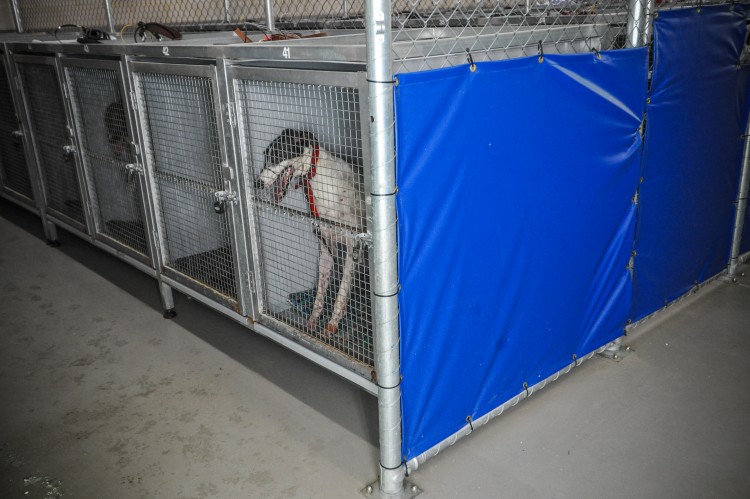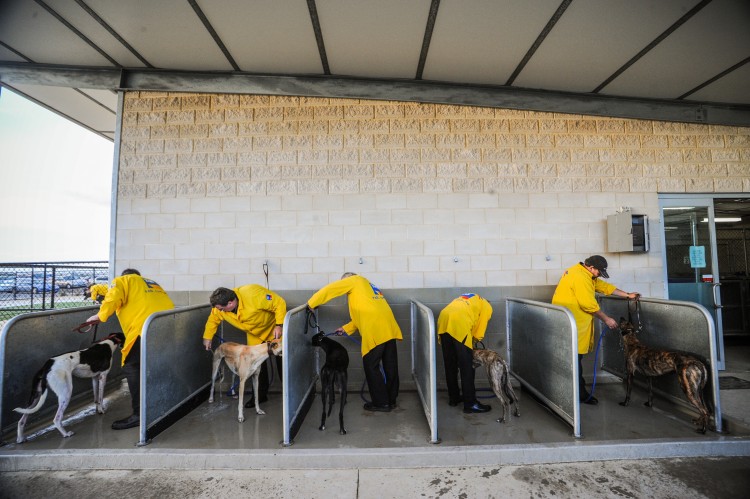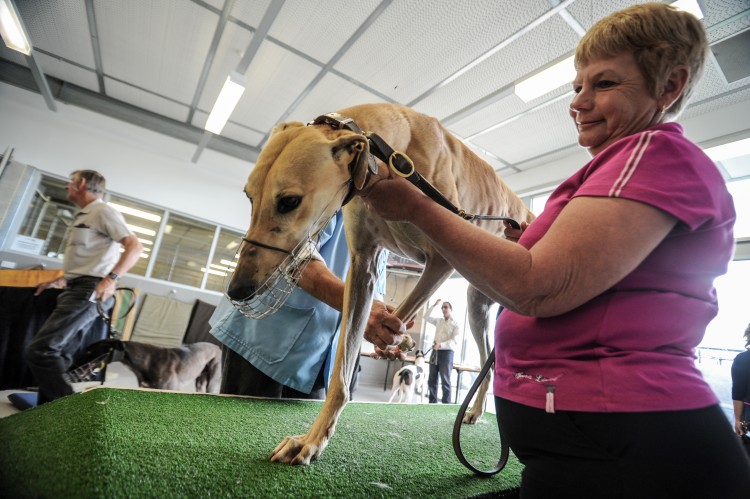As of January 2020, greyhound racing is legal in nine U.S. states and operational and active in only five U.S. states: Alabama, Arkansas, Iowa, Texas and West Virginia. Dog racing has been outlawed in the majority of U.S. states, including most recently in Florida and Arizona. Commercial dog racing is legal in six other countries or jurisdictions: Australia, Ireland, Mexico, New Zealand, the United Kingdom and Vietnam. Many of these industries are experiencing financial struggles and declines in gambling. In the U.S., greyhound gambling has declined 70 percent since 1990.
Dog racing is cruel and inhumane. Here’s why:
Greyhounds are overbred
Each year, tens of thousands of racing greyhounds are bred in the U.S, Ireland and Australia, creating at least 8,000 greyhound litters for the sole purpose of racing and gambling. This produces about 48,000 greyhound puppies per year, many of whom are not even recorded by the industry. Because of over-breeding, many of these dogs end up being exported to countries with few animal welfare or protection laws, including China, Macau, Vietnam, Pakistan, Argentina and Spain.

Greyhounds live in extreme confinement
For 23 hours a day, greyhounds live in warehouse-style stacked cages where they are confined. They typically can barely move or walk. In the U.S., standard cage sizes are barely large enough for greyhounds to stand up or turn around. In some countries, the kennels where greyhounds are confined have cold hard concrete slab floors and metal bars, much like a prison cell.
Greyhounds suffer catastrophic and serious injuries while racing
Greyhounds suffer routine injuries while racing, and many are catastrophic. They may collide into another dog, break bones, have seizures, and suffer paralysis. If they survive, they are likely to be euthanized if their injuries render them no longer useful for racing.
Between 2008 and 2016, more than 15,000 injuries were reported in the U.S., and of these over 1,000 dogs were killed or died from their injuries. These are only those that were reported, there are likely tens of thousands more that are unreported. In many countries, injuries are not reported at all, including in Ireland, Mexico, New Zealand, the U.K., Vietnam, Australia, and in the U.S. state of Alabama, so getting an accurate accounting of injuries is extremely difficult.

Greyhounds are raced to death
For greyhounds, their fate is not a good or happy one. The vast majority either die from severe injuries or are found unsuitable to race, and too often owners and trainers simply euthanize these dogs, or even kill the dogs themselves as a cheap alternative to proper veterinary euthanasia. In Australia, as many as 17,000 healthy greyhounds are killed each year. In Ireland, an average of 38 greyhounds are killed each month as a result of industry over-breeding, but statistics show the number is as high as 6,000 greyhounds killed each year in Ireland. Mass graves have been found outside of racing tracks in Australia and New Zealand. In the U.K., one man, David Smith, shot and killed over 10,000 greyhounds in his backyard slaughterhouse in 15 years—dogs who were too old to continue racing, were injured or sick, or were no longer successful. The U.K. reports about 12,000 greyhounds disappear every year.
How can we ever justify killing a dog simply because they cannot compete or they become too old for the industry? Dog racing is a deeply unethical industry that abuses, uses, exploits and kills dogs purely for profit.
Greyhound racing is an industry rife with neglect and abuse
The dog racing industry is notorious for committing some of the most heinous and egregious forms of animal cruelty, including neglect, starvation, mutilation, drugging, abuse and abandonment. In Florida, dogs were reported starving to death and found barely alive on the Ebro Dog Track. Fortunately, Florida’s citizens unanimously banned dog racing in 2018, effective in January 2020. In New Zealand, dogs don’t “retire,” they are killed when they can no longer run. Dogs who are exported to other countries can die of starvation, malnutrition, dehydration and suffocation during transit. In “live baiting,” live small animals like opossums and rabbits are used as lures to “blood” the greyhounds.

Racing greyhounds are routinely drugged
Drugging and doping greyhounds before they race is not uncommon, and in some places it is even routinely done. Many of the drugs are illegal, like cocaine, erythropoietin (EPO), morphine and amphetamines. The industry will often chalk up the finding of illegal drugs in dog testing to “tainted food” and a few bad people in the racing industry. The Association of Racing Commissioners is responsible for drug testing at race tracks and managing drug violations, but the industry is so corrupt that the regulations are frequently not followed, fines are not issued, and the dogs always pay the price.
What You Can Do
- Sign these petitions. Add your name to Grey2K USA petitions.
- Take action. Sign up for GREY2K’s Action Center to get Action Alerts to help greyhounds.
- Contact your state legislators. If you live in Alabama, Arkansas, Texas, Iowa or West Virginia, please contact your state legislators to ask them to end greyhound racing forever. Contact forms are here.
- Host an outreach table in your community. Volunteers are needed to table and distribute information about greyhound racing. Support this effort by setting up a table at your local library, town hall, church, school or venue of your choice. Learn how here.
- Hold a rally for greyhounds. Join people in your community to rally against dog racing. Here’s how to hold a rally.
- Adopt a greyhound. Rescue a retired greyhound. There are dogs all over the world who need to be adopted. Here is a list of rescue groups that adopt out greyhounds.
This article was compiled from information originally published on the Humane Decisions website.
Featured image: members of the audience watch a race in Glasgow, Scotland. Image credit Matthias Berg, CC BY-SA 2.0.





